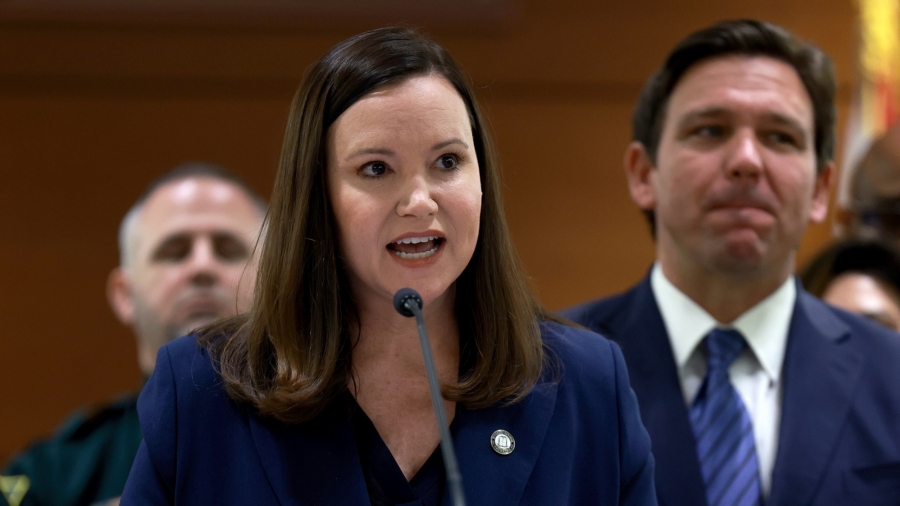Florida Attorney General Ashley Moody filed an appeal with the Supreme Court asking the court to decide if states have the power to regulate how social media companies moderate content on their platforms.
Given growing public interest in the issue of social media censorship, the Supreme Court may have difficulty refusing to hear the case.
The case pits the right of individual Americans to express themselves freely online against the right of social media platforms to make editorial decisions about content.
Republicans and conservatives have complained for years about being censored by the platforms.
They were furious when platforms banned then-President Donald Trump in January 2021, blocked a New York Post article about Hunter Biden’s laptop computer, and silenced dissenting opinions on the origins of the CCP virus and on treatments for the disease it causes.
Democrats and liberals say the platforms don’t do enough to suppress so-called hate speech and alleged misinformation.
The petition in the case known as Attorney General, State of Florida v. Netchoice LLC, was filed on Sept. 21.
Netchoice is a coalition of trade associations representing social media companies and e-commerce businesses.
The filing comes as a majority of U.S. states are looking at legislation that would regulate social media platforms such as Twitter and Facebook in the public interest.
Florida and Texas have enacted laws that impose limitations on the ability of social media companies to moderate speech on platforms and mandate that the companies provide disclosure to the public.
The social media businesses say the Florida and Texas laws that would limit their ability to ban political speech they consider objectionable violate the First Amendment.
Supporters of the laws counter that because the Biden administration, including the FBI, has been pressuring the platforms to censor speech the platforms lose their First Amendment protection because they have become agents of the government.
Appellate courts disagree on the constitutionality of the two state laws.
On May 23, the U.S. Court of Appeals for the 11th Circuit struck down much of the Florida law (SB 7072).
When Florida Gov. Ron DeSantis, a Republican, signed the measure, he said its purpose was to fight the “biased silencing” of “our freedom of speech as conservatives … by the ‘big tech’ oligarchs in Silicon Valley.”
The 11th Circuit stated in its ruling that “with minor exceptions, the government can’t tell a private person or entity what to say or how to say it.”
“We hold that it is substantially likely that social-media companies—even the biggest ones—are ‘private actors’ whose rights the First Amendment protects … [and] that their so-called ‘content-moderation’ decisions constitute protected exercises of editorial judgment, and that the provisions of the new Florida law that restrict large platforms’ ability to engage in content moderation unconstitutionally burden that prerogative.”
The 11th Circuit left undisturbed a portion of the law requiring companies to provide more transparency about their moderation policies.
On Sept. 16, the U.S. Court of Appeals for the 5th Circuit ruled that Texas HB 20 was constitutional, rejecting, in its words, the “idea that corporations have a freewheeling First Amendment right to censor what people say.”
The Texas law “does not chill speech; if anything, it chills censorship.”
Citing the decisions of both appellate courts, Moody, a Republican, wrote in her petition that the “irreconcilable divide” between courts “warrants this court’s review.”
Social media has become “the modern public square,” Moody wrote, quoting a report saying that in the United States 240 million people use social media and “almost half of all American adults use social media to get their news.”
“Social media is also where Americans engage about politics—about one-third of the posts on Twitter are ‘political in nature,’” she wrote, quoting another report.
SB 7072 is Florida’s effort at “preventing social-media platforms from abusing their power over the public square,” Moody added.
Netchoice also wants the Supreme Court to hear the case in order to clarify the applicable law.
“We agree with Florida that the U.S. Supreme Court should hear this case, and we’re confident that the First Amendment rights of websites will be upheld,” Netchoice vice president Carl Szabo said in a statement.
“We have the Constitution and over a century of precedent on our side.”
From The Epoch Times


